|
1 (35) St. Martin's Hill
Longport
Canterbury
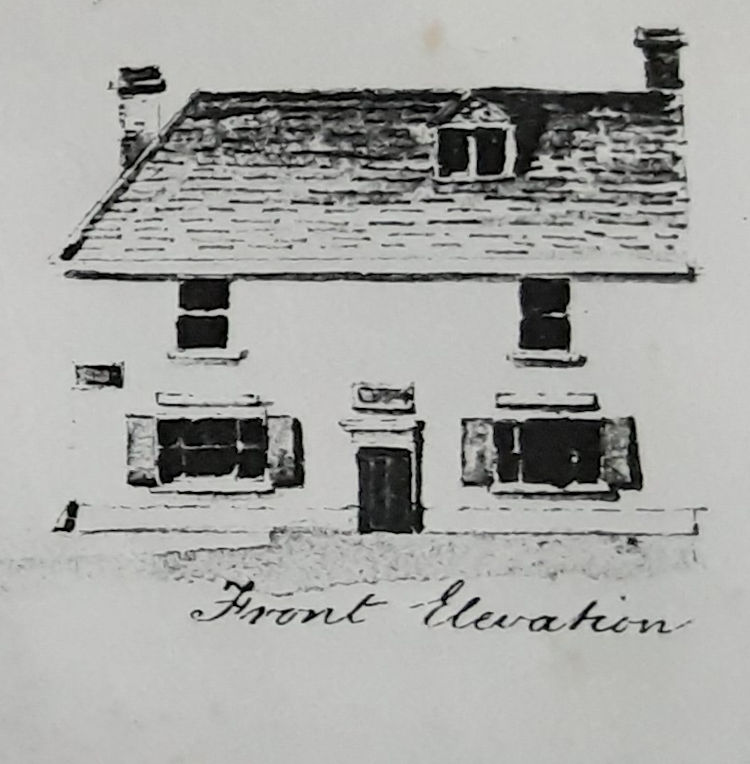
Above showing Front Elevation Plans 1600. Kindly sent by Heikki
Honkanen. |
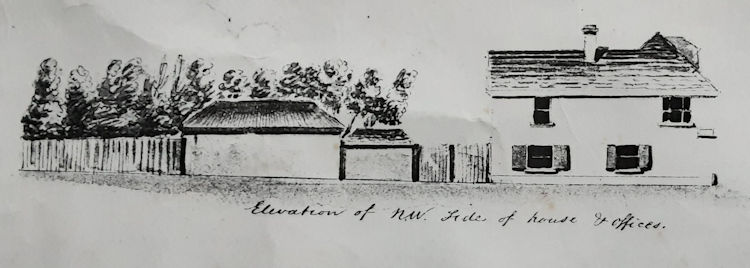
Above showing Side Elevation Plans 1600. Kindly sent by Heikki
Honkanen. |
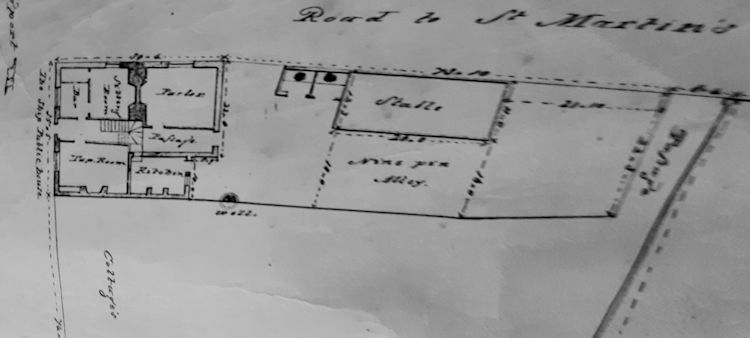
Above map 1600, Kindly sent by Heikki Honkanen.
The cowskin map in Cathedral archives from early 1600 illustrates a
3-gabled building, the present one is most likely before window and
hearth tax late 1600. Due to new taxes number of windows was reduced,
some fireplaces perhaps also blocked in. The original positions and
sizes of windows were found inside when plaster removed after 1985, and
re-instated.
There is a watercolour of the old Sessions House and prison in
Canterbury museum early 1800, The Ship appears in the background. |
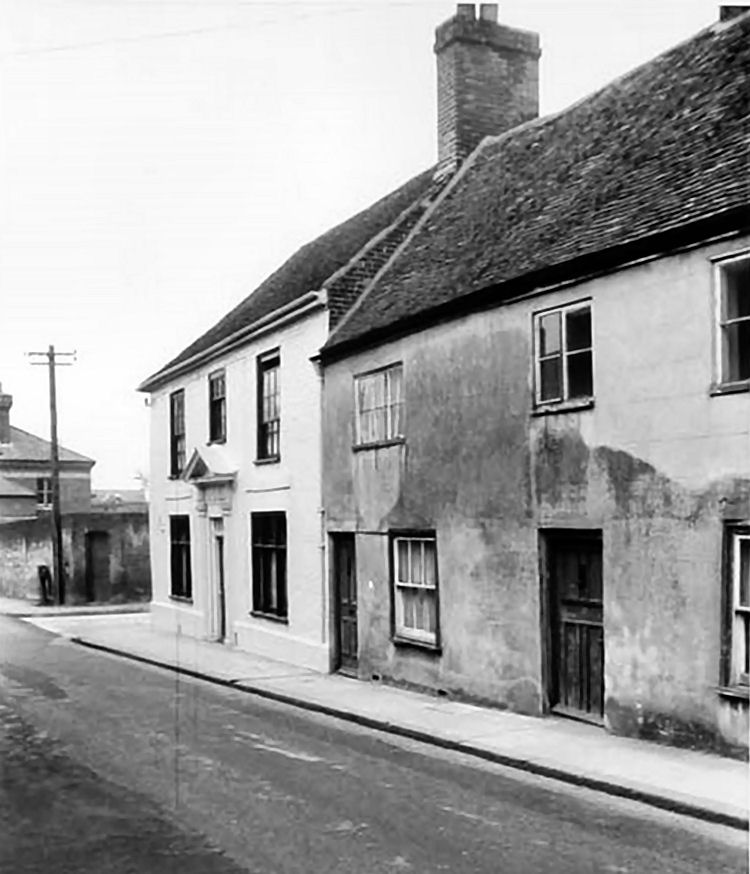
Above photo, circa 1943. Kindly sent by Tim Timpson. |
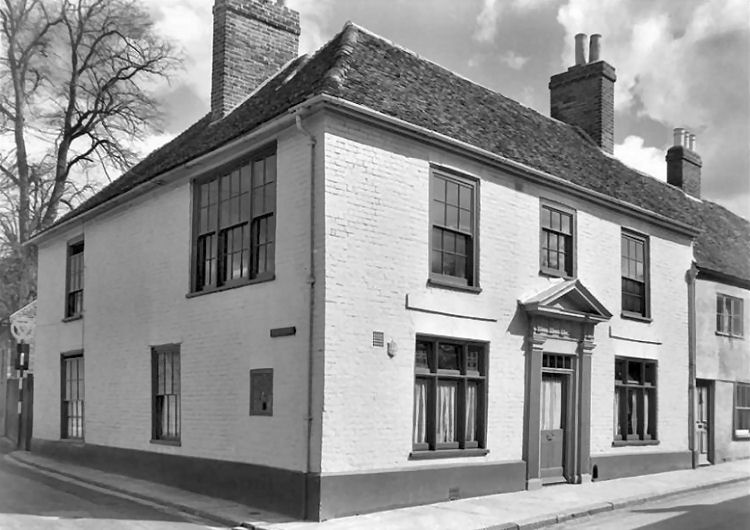
Above photo, 1948, kindly sent by Rory Kehoe. |
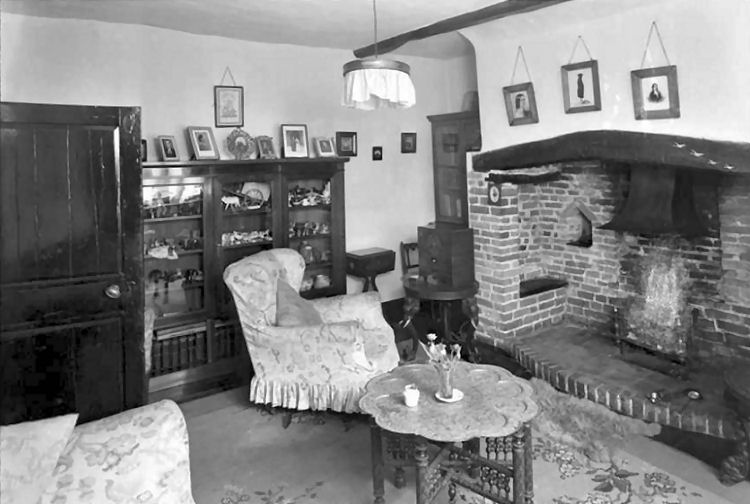
Above photo, 1948, kindly sent by Rory Kehoe. |
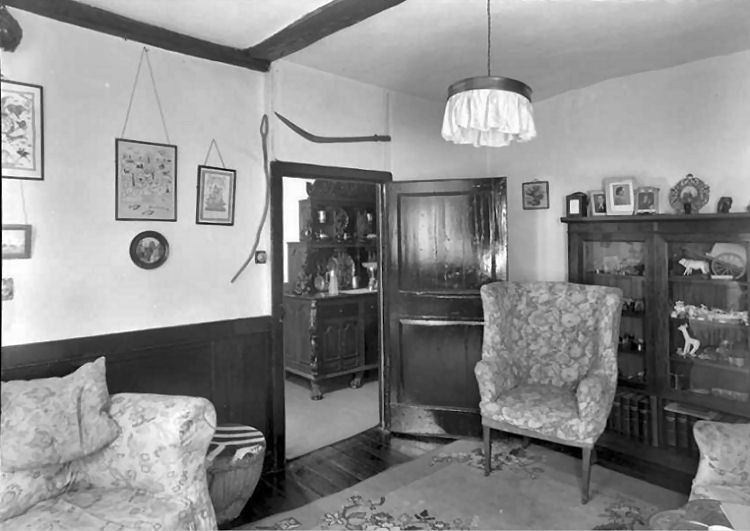
Above photo, 1948, kindly sent by Rory Kehoe. |
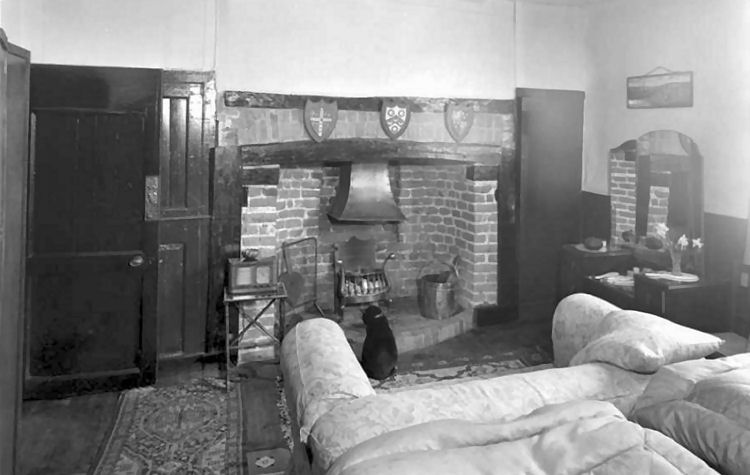
Above photo, 1948, kindly sent by Rory Kehoe. |
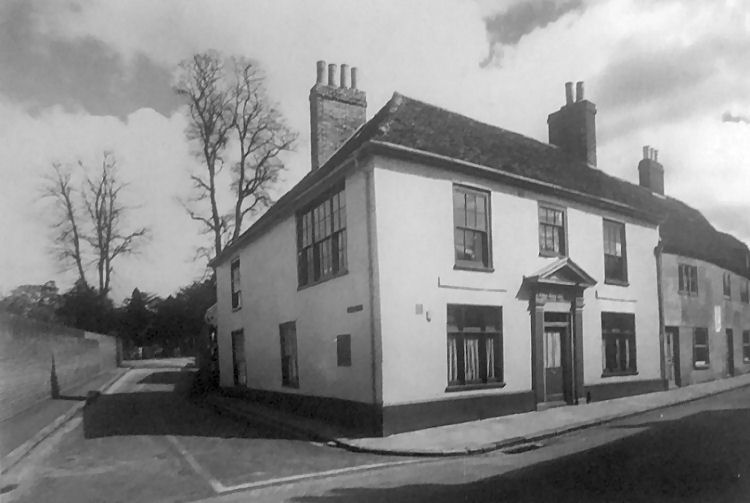
Above photo, circa 1949. Taken about 20 years after the pub shut, when
it was occupied by a Mr. Jasper Percy Mounsey. (1887-1952)
The "Ship" backed onto the graveyard of St. Martin's, the oldest
parish church in England. Kindly sent by Rory Kehoe. |
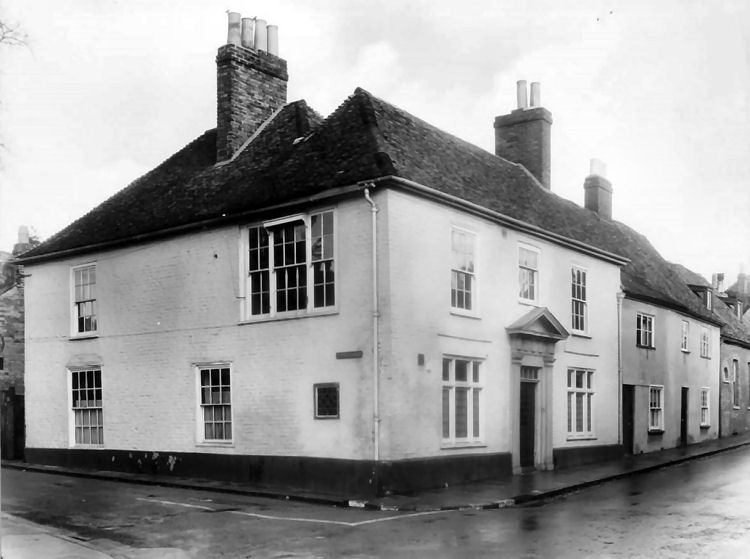
Above photo, circa 1961. Kindly sent by Tim Timpson. |
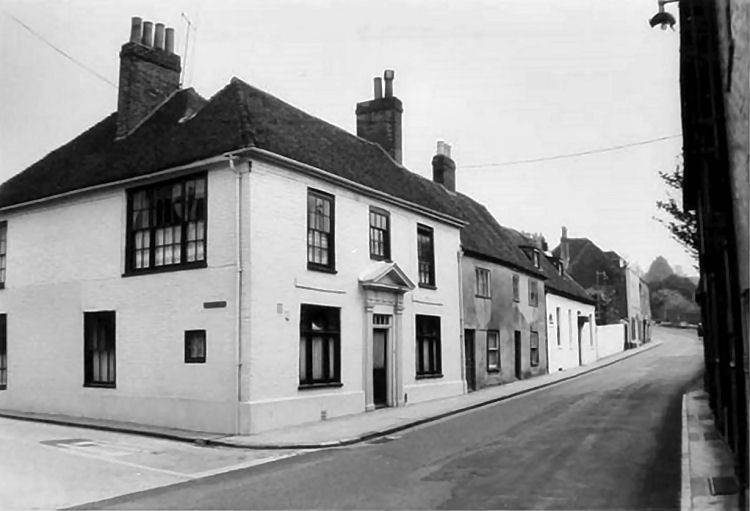
Above photo, circa 1961. Kindly sent by Tim Timpson. |
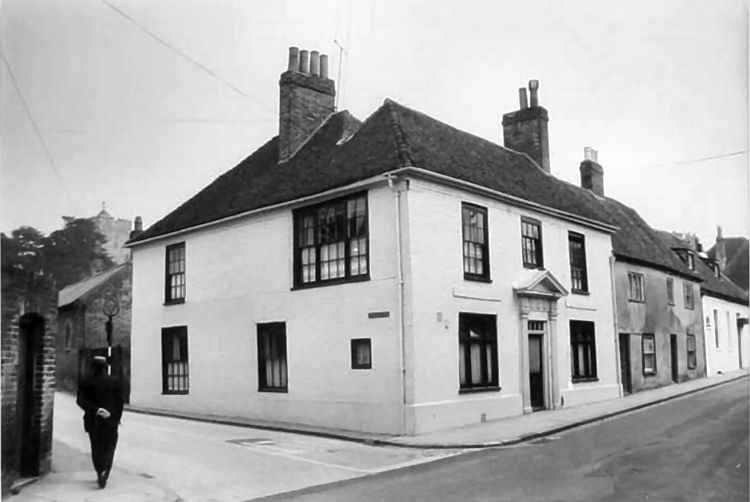
Above photo, circa 1961. Kindly sent by Tim Timpson. |
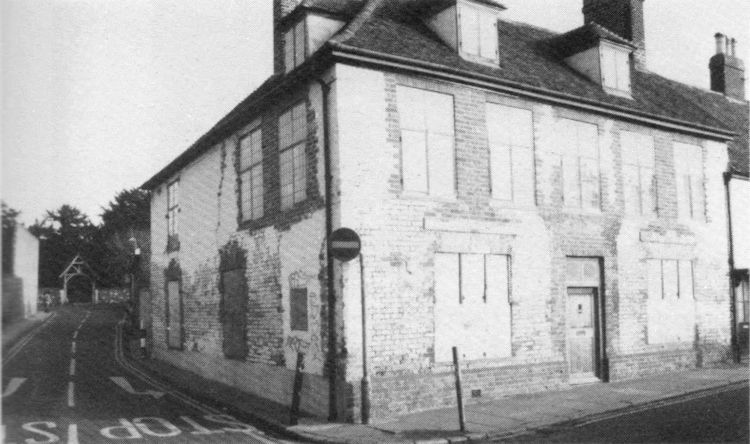
Above photo, date unknown. |
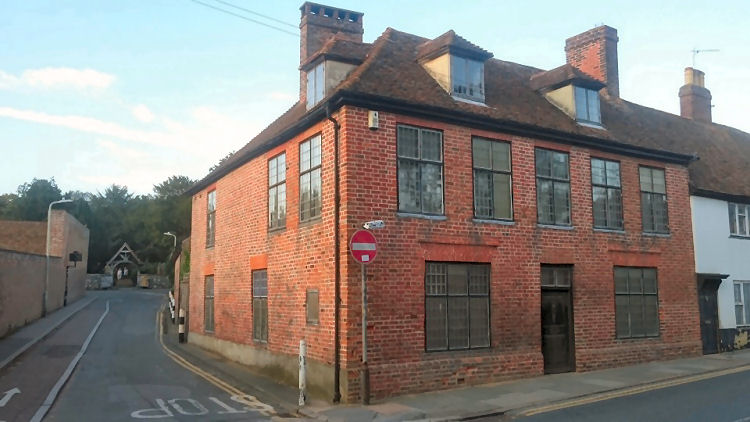
Above photo, August 2019, kindly sent by Rory Kehoe. You can just see
the lych gate of St. Martin's church where corpses could be sheltered if
the priest was running a little late for burial services.
To the left is the eastern perimeter wall of the former Canterbury
Gaol, which is now part of Christ Church University. |
Marcus Berry bought The Ship Inn in 1597, already known during Edvard VI
time according some report.
Situated at number 1, number 2 was the "Princess
Charlotte," that closed in 1972 after a compulsory purchase.
Mr Enderby quotes a City Rent Book as early as 1597 where the Corporate
Freehold property on this site was leased for 257 years - this expired in
1854.
The "Ship" has been in 1692 found in a list of licensed premised in
Canterbury. In 1693 the Billeting List gave the inn six soldiers.
From the Cathedral Archives there is an Indenture dated 14th January 1597
made between the Mayor and Commonalty of the City of Canterbury on the one
part and Mark Berry one of the Aldermen of the same City on the other
part.....to hold the said Mark Berry, his exors and assigns from the feast
of St Michael the Archangel last past into the end and term of 257 years, at
the yearly rent of 4d.
The seal of the Mayor affixed.
15th July 1854. Then in the occupation of Richard Clark.../'Lying in the
Parish of St Martin, near and without the walls of the said City and Borough
of Canterbury......." Power to distrain if yearly rent of 4d be unpaid for
14 days.
Calloway & Furley, Canterbury.
A report in the Kentish Observer dated 8th February 1923 headed:
"An Ancient inn to be closed". Counsel produced a lease for THE SHIP
granted in 1583 and stated that the House could be traced back for 400
years.
THE SHIP closed in 1924.
|
Kentish Gazette, 30 October, 1792.
Death.
Sunday Mr. Francis Cobb, master of the "Ship" public house, on St.
Martin's Hill near this city.
|
|
Kentish Gazette 4 June 1819.
I few night since, the "Ship" public house, Saint Martins Hill, near
this City, was forcibly entered and two legs of pork, 26 lbs. each,
a quantity of liquor, and several other articles, stolen therefrom,
with which they got off unperceived.
|
|
Kentish Gazette, 23 March, 1821.
DEATH.
March 20, in Ruttington-lane, Canterbury, Mr. William Pearson,
formerly landlord of the "Ship," St. Martin's-hill.
|
|
Kentish Chronicle, 10 November, 1829.
Death.
Nov. 9, universally respected, aged 35 years, Sarah, wife of Mr.
John Ealse, of the "Ship," St. Martin's
Hill.
|
|
From the Maidstone Gazette and West Kent Courier, 25 May 1830.
A few days ago Mrs. Harris, of the "Ship" public house, Canterbury,
while in the act of waiting on some customers, suddenly dropped down
dead upon the table around which the company were sitting.
|
|
Kent Herald, 29 May 1845.
Inquest on the Body of an Infant found in a Well.
On Thursday an inquest was held before T. T. Delasaux, Esq., coroner, at the
"Ship Inn," Canterbury, on the body of a female infant, which had been found in
the well, on St. Martin's Hill, the water of which is used by the residents in
the neighborhood.
Amelian Cullen deposed that on Monday morning, when dipping some water from the
well, she dragged something of a bundle up, and, with the assistance of Richard
Clark, afterwards tried to get it out, but could not. It was a bundle like that
in which the body of the child had been found, with an outer covering of black.
Jesse Filmer, with the assistance of Thomas Hare, got the bundle out of the well
on Tuesday morning, which was found to be the body of a child. There were about
eight feet of water in the well.
Mr. Andrews, surgeon, stated that he minutely examined the body on Tuesday, but
could discover no external marks of violence. It was that of a female child,
fully grown, but not large, which had been dead about a week. He made a post
mortem examination on Thursday, and found the contents of the chest to be in
fresh a fresh state. The lungs had been inflamed, with the exception of a very
small portion. He was of opinion, both from the above circumstances, and that of
the appearance of the blood vessels connected with the heart, that the child was
born alive, and might have bled to death. The blood vessels certainly would have
appeared the same had the child being born only partly alive. There have been no
further evidence to show how the child had met with his death, nor who was its
mother, a verdict of "Found Dead" was returned. There can be little doubt that
the child had been destroyed by its unnatural parent, and thrown into the well.
|
|
Maidstone Journal and Kentish Advertiser, Tuesday 12 June 1849.
Canterbury.
Important sale of the extensive Brewery of Messr's Flint, including 30
old established Inns and Public Houses, and other valuable property.
Mr. V. J., has received instructions to sell by auction, at the
"Fountain Hotel," Canterbury, on Tuesday and Wednesday, 26th and 27th of
June, at 12 o'clock each day, (in consequence of the death of the senior
acting partner and the retirement of the surviving partners,) the
valuable property known as Messrs. Flint's Brewery, in Stour Street,
Canterbury, and the Inns, Public Houses, and other valuable property
connected with theirwith. The first day sale on Tuesday, 26th June,
1849, will comprise the following property in and near the city.
Public houses.
Lot 1. The "City of Canterbury," situate on the road to Whitstable.
Freehold.
Lot 2. The "George and Dragon," Westgate without, leasehold under Hind's
charity for 17 years unexpired.
Lot 3. The "Three Compasses," Westgate
within. Freehold.
Lot 4. The "Bell Inn" and Coach Office, in the High Street. Freehold.
Lot 5. The "Prince of Wales," St. Alphege Lane,. Freehold.
Lot 6. The "Weavers Arms," Broad Street, freehold and partly leasehold.
Lot 7. The "White Swan," Northgate. Leasehold under St. John's Hospital
for a short term, at a ground rent.
Lot 8. The "Kings Head," Northgate.
Freehold.
Lot 9. The "Swan Inn," at Sturry (close to the railway station).
Freehold.
Lot 10. The "Ship," St. Martins Hill, freehold.
Lots 12. The "Star Commercial Inn and Tap," St George's, close to the
Cattle market and Dane John. Freehold.
Lot 13. The "Blue Anchor," Old Dover Lane, near the Cattle market.
Freehold.
Lot 14. The "Fleece Inn," High Street, opposite to the Corn market.
Freehold.
Lot 28. Three neat Cottages opposite the Brewery, with large gardens
extending to the river.
Lot 29. The "Two Brewers" public house and Spirit Warehouse, adjoining
the last lot.
Lot 31. The "Black Dog" public house, Castle Street.
Lot 34. The "Duke's Head" Public House, Wincheap Street.
Lot 35. The "King's Head," Public House, Wincheap Street.
Lot 37. The "Royal Exchange," public house, Stour Street.
Lot 38. The "Kentish Arms," public house, and 5 cottages in Jewry Lane.
Leasehold for a short term at a low rent.
Lot 40. The "Duke William," at Ickham, abiout five miles from
Canterbury. Freehold.
Lot 41. The "Royal Oak Inn," at Deal. Freehold except a small portion.
Lot 42. The "King's Arms," Beach Street, Deal, and Cottage in the rear.
leasehold for a short term, at a Ground rent.
Lot 43. The "Fleur De Lis," near the Railway Station, Dover. Leasehold
for a term of 6 years, at a Ground rent of £3.
Lot 44. The "Two Brewers," Limekiln Street, Dover. leasehold for a term
of 46 years, at a ground rent of £3.
Lot 45. The "Fountain Inn, adjoining the Market place at Dover.
Freehold.
Lot 46. The "Lord Nelson," Radnor Street, near the harbour, Folkestone.
Freehold.
Lot 47. The "Bricklayers Arms," Fancy Street, Folkestone. Freehold.
Lot 48. The "Castle Inn," at Sandgate. Leasehold for a short term, at a
ground rent of 7s. 6d.
Lot 49. The "King's Head Hotel and Tap," at Margate. Freehold.
Lot 50. The "New Inn," at Elham, on the road to Hythe. Freehold.
Lot 51. The "King's Arms," at Milton near Sittingbourne. Freehold.
The Public Houses are for the most part in the occupation of
unexceptionable tenants, and the majority of them are doing trades, both
in beer and spirits, considerably above the average run of Country
houses. (None of them have been beer shops; they're all old Licence
Houses, with connections of long standing, thereby affording ample
security for the permanency of the trade). The Premises generally are in
a superior state of repair.
Particulars and Plans, price 1s. each, may be had of Messr's. Furleys
and Mercer, Solicitors, Canterbury; at the "Fountain Hotel;" and of Mr.
V. J. Collins, 3, Moorgate Street, London.
|
|
Kentish Gazette, 8 June 1852.
Saturday.
Joseph Burley, a young man, was charged with having stolen three
sovereigns from the person of William Holyer, an original character,
whose double "Buz" has graphically depicted in one of his works. The two
parties had been drinking together the previous day, and the following
evidence was elicited by the bench of the prosecutor, who described
himself as a butcher just retired from business, and living at Ramsgate,
but the precise part of the town the peculiar treacherous state of his
memory prevented his accurately describing, though no one knew the name
of the place better than he did. Having collected the scattered remnants
of his reflections, by the application of his hand to his forehead in a
style that would have done credit to a "gem" of the sister isle, he
applied his powers, in a philosophic mood, to detail the incidents of
his rambling adventure.
He said:- I left Ramsgate in the morning with five sovereigns and a half
crown in my pocket, - but it is pretty well melted now. I had a pony
with me. I saw the prisoner at Fordwich, and we had some ale altogether.
He appeared desirous somehow, of keeping my company. We left there about
10 o'clock for Canterbury. I had never seen the prisoner before. I
believe we came into Canterbury together, but you see I don't recollect
very well when I have had a little drink. I called at Newman's in the
Military Road, but I don't know whether he went with me or not. I went
to the "Ship" at St. Martin's Hill, where the prisoner said I was his
father. We sat drinking together - I paid all. I dropped off to sleep,
and I don't know what occurred after that. I know I had three sovereigns
in my pocket when I went into the "Ship."
John Ireland proved that the prisoner and prosecutor were drinking
together, and were both the worse for liquor. The former put his hand
into the prosecutor's pocket and took out three sovereigns, with one of
which he paid for some soda water and beer. He held the money in his
hand openly, and shortly after left the house. Witness followed and gave
him into custody of the police.
Superintendent Spratt searched the prisoner, who placed two sovereigns
in his hand and told him to put it on one side for himself. There was
18s 2d. on him in addition to the gold.
The prisoner in defence stated that he had been drinking with the
prosecutor, who had requested him to sell his pony for him. The
prosecutor told him to take the money, and then he (prisoner) said he
would take care of it for him, as he was the "soberest." He left the
house with the intention, as he had told the prosecutor, of seeing the
parties about selling the horse, when he was taken into custody.
Ireland was re-called, and stated that no such conversation took place
between the prosecutor and the prisoner, as had been alleged by the
latter.
The prisoner thereupon change the venue of the conversation, which he
urged was on their way from the "George and Dragon" to the "Ship."
He was fully committed for trial at the sessions.
|
|
Southeastern Gazette, 21 June 1853.
A Public House and Land for 4d. a Year.
At a meeting of the Town-council on Monday, the application of Mr.
Furley for a renewal of the lease of the "Ship" public-house, St.
Martin’s-hill, and land adjoining, originally granted to one Mark
Berry for 300 years, at 4d. a year rent, was again considered, the
opinion of the Solicitor-General having been obtained as to the
legality of the proceeding. A clause in the lease bound the
corporation to renew the lease for 300 years, providing application
was made for the same prior to the expiration of the term of years
first granted. Mr. Bethell was of opinion that the corporation were
perfectly competent to renew the lease, but as they were trustees of
public property, he advised an application first to the court of
equity. Some discussion took place on the subject, and ultimately it
was resolved, upon the motion of Mr. Sankey, seconded by Mr. Walker,
that a new lease be granted for the term of 300 years, at 4d. per
year. Thus is the public property confiscated, virtually given away,
for a period of 300 years, without, comparatively speaking, the
slightest consideration in return. Is there no public spirited
individual in this city who will stand up in defence of its
property, and prevent the ultimate realization of this intended
alienation of such a valuable commodity as "lands and buildings?"
Surely there is one, for the credit of the city and the preservation
of its honour!
|
|
Kentish Gazette, 16 May 1854.
Coroner's Inquest.
Mr. Delasaux held an inquest on Wednesday at the "Ship Inn," in this
city, on the body of an infant child belonging to a gipsy tribe, of the
name of Taylor; which though well as usual when its mother went to sleep
overnight, was found dead by her aide in the morning.
Verdict "Natural death."
|
|
Kentish Gazette, 7 April 1857.
DEATH.
HAYWARD:- March 21, in St. Peter’s-lane, Canterbury, Mr.
Richard Hayward,
formerly of the "Ship Inn," St. Martin’s-hill, aged 80 years.
|
|
From the Kentish Chronicle, 8 September, 1860.
LOCAL INTELLIGENCE. FATAL ACCIDENT.
An inquest was held on Thursday evening, by C. J. Fox, Esq., deputy
coroner, at the "Ship," St. Martin's Hill, on the body of Frederick
Skinner, aged 11 years, who met with an accident, which proved fatal
under the following circumstances; he was employed in putting pug into a
brick mill, in Longport, when stooping to avoid the bar as the horse
passed round, not being sufficiently low the bar caught his head, which
drew him to the mill and crushed it. The verdict returned was Accidental
Death.
|
|
South Eastern Gazette, 11 September, 1860.
A Boy Crushed to Death.
A frightful accident occurred at the brickworks connected with the
London, Chatham, and Dover railway, situate in the Barton Fields, on
the afternoon of Thursday last. A little boy named Frederick
Skinner, only 11 years of age, son of one of the brickmakers, and
who was rendering a little assistance, met with almost instantaneous
death, his head being completely crushed by the shaft of the
pug-mill. In the evening the deputy coroner, C. J. Fox, Esq., held
an inquest on the body, at the "Ship Inn," Longport, when Catherine
Lemar, residing in Broad-street, deposed that while at work between
two and three o’clock that afternoon in Little Barton Fields, she
saw the deceased putting some of the "slop" into the pug-mill, and
his head was almost immediately crushed between the pole and the
mill. She gave the alarm, and one of the moulders took the deceased
away and then went for the doctor. He was laid down on some straw,
his head being covered with blood, and his brains were hanging from
his nose and mouth. Aaron England, labourer, confirmed the last
witness’s testimony, stating that he asked some persons who were
standing by to go for the doctor, but as none were willing to do so,
he went himself. The deceased never spoke, and witness believed he
died almost immediately after the accident. The pug-mill in question
was constructed similar to all others. Mr. T. S. Cooper, surgeon,
said he found the boy dead, he having sustained a comminuted
fracture at the base of the skull. The brain was protruding from the
nose, and blood issuing from both ears.
Verdict "Accidental death."
|
|
South Eastern Gazette, 9 October, 1860.
Highway Robbery by Soldiers.
On Wednesday last two privates in the 90th Regt., named Jas, Buckley
and John Bremner, were charged with having stolen a watch, a bunch
of keys, and several other articles, from the person of George
Hatton, also a private in the same regiment, on the previous night.
It appeared that at about half-past six o’clock on the previous
evening prosecutor went to the "Shakespeare" public-house with the
prisoners and had some beer. They shortly afterwards left. Buckley
told prosecutor that they wanted to make a call, and would show him
a near cut home. They went across the fields from the "Ship Inn,"
St. Martin’s, in the direction towards the Military Hospital, and
Buckley asked the prosecutor to show him the time. He refused to
take his watch out, and replied that it was half-past 8. Buckley
then asked him to show him the watch, and said he would not hurt it.
Prosecutor, however, said it was too dark for him to see it. Buckley
then put his arms round prosecutor’s waist and threw him down. Bremner sat upon him, and the prisoners put their hands into his
pockets. Prosecutor called out, and Bremner then placed his hand
over his mouth and his knuckles against his throat. Prosecutor was
getting weak and took his hand out of his pocket (where he had been
holding his watch), when Buckley seized the watch and then ran off.
He identified the bunch of keys as his property. In addition to the
watch and keys, 1s. 5d., and a piece of tobacco were taken from him.
The value of the watch (which had not been found) was 25s.
Sergt. Carr proved finding the keys, a knife, and a piece of
tobacco, in the field spoken of by the prosecutor, at seven o’clock
that morning.
P.S. Andrews deposed to taking the prisoners into custody at
half-past 11 on the night in question. The prisoners, who denied all
knowledge of the robbery, were committed for trial.
|
|
South Eastern Gazette, 23 October, 1860.
CANTERBURY QUARTER SESSIONS.
The Autumn Quarter Sessions for this city and borough were held
before the Recorder, John Deedes, Esq., on Wednesday last. There
were 12 prisoners for trial.
James Buckley and John Bremner, soldiers, were indicted for stealing
from the person of Geo. Hatton, a watch, value 25s., and other
articles, at St. Mary Northgate, on the 2nd inst. Mr. Barrow
prosecuted.
The prosecutor, also a soldier, deposed that on the evening in
question he saw both prisoners at the Soldiers’ Institute. They
asked him to go and have some beer, and he accompanied them to the "Shakespeare."
They stayed there about half-an-hour. When they left they went
towards St. Martin’s-hill, and called in at the "Ship." The
prisoners then told him they would show him a short cut to the
barracks, and took him across the hospital fields. While going
along, Bremner asked witness the time, and he replied that it was
half-past eight. Witness had his watch in his fob pocket, and the
prisoners asked him to show it to them. He told them that it was too
dark for them to see it, and, having his suspicions, he put it into
his trowsers pocket. Buckley then threw him down, and Bremner
pressed his knuckles upon his throat and sat upon him. Witness
called out as loud as be was able. Buckley, however, put his hand in
witness’s pocket, took the watch out, and wrenched it from the
chain. The prisoners then ran off. Witness afterwards found that he
had lost a bunch of keys, a knife, and a piece of tobacco. When he
went with the prisoners he had his own cap, but on the following
morning he found that he had got another man's, and he believed it
was Bremner’s.
Sergeant Carr, 90th Regt., proved that on the night of the 2nd inst.
he apprehended the prisoners. On the following morning he went
across the hospital fields, and there he found a bunch of keys, a
knife, and a piece of tobacco. Where he found the articles, the
grass had the appearance of a struggle having taken place.
P.C. Andrews was with the last witness when the prisoners were
apprehended. On the morning following, he found a soldier’s cap
strap in the cell in which the prisoners were locked up.
The prosecutor was re-called, and he identified the knife, keys, and
also the strap as his property.
The jury found the prisoners guilty, and they were each sentenced to
four years’ penal servitude.
|
|
From the Kentish Chronicle and General Advertiser, 23 November, 1861. Price 1 1/2d.
INQUEST AT CANTERBURY.
An inquest was held on Tuesday at the “Ship Inn,” St. Martin's Hill, by
T. T. Delasaux, Esq., coroner on the body of Charles Voisey, a prisoner
in the county gaol, who died on the previous day. It appears that on the
23rd of October the deceased was taken ill with spitting of blood, and
continued getting worse till the 19th instant, when he died. Mr. Tassell
attended him. The jury returned a verdict of “Natural Death.”
|
|
From the Kentish Chronicle, 5 April, 1862.
INQUEST.
T. T. Delasaux Esq. held an inquest at the “Ship Inn,” St. Martin’s
Hill, Canterbury, on Monday, on the body of John Baby, a prisoner
convicted in St. Augustine's gaol. The following evidence was taken:-
Thomas Taylor, head warder of the gaol said:— The deceased, John Baby,
was committed on the 19th of March last to St. Augustine’s Gaol, from
the city of Canterbury, under conviction for breaking windows at the
Workhouse. In a day or two he complained of illness, and was placed
under the care of the surgeon, and continued so until his death, which
took place on the 29th of March.
Robert Tassell, surgeon, residing in Canterbury, said:- The deceased was
a prisoner in the gaol of St. Augustine’s, and on the 21st of March he
first complained of illness, and for which I intended him. He was
suffering from catarrh, and on the 24th he had decided symptoms of low
fever, and I treated him accordingly. He had everything necessary, but
died on Saturday from a natural cause.
The jury returned, a verdict of “Natural Death."
|
|
From the Whitstable Times and Herne Bay Herald. 21 September 1867. Price 1d.
SUDDEN DEATH
On Monday last an instance of the uncertainty of life occurred at Hop
Hall hop gardens. It appears that a man named Daniel Gammon, a resident
of Longport, was hop picking, when he was observed to fall; and on a man
named Sladden going to pick him up, was found to be dead. He was then
taken to the "Ship Inn" to await the Coroner's inquest. In the evening
the inquest was held on the body, and the following evidence was taken:— William Strut said:- This morning about nine o'clock I saw the deceased
in Hop Hall hop gardens hop picking. I spoke to him, and saw him several
times as I passed up and down the gardens. At that time he appeared in
his usual health. My attention was afterwards drawn to the deceased by a
man named Sladden, and on going to him I found him lying on the ground.
With assistance I turned him over, and I believe he shortly afterwards
expired. Henry Ebenezer Hutchings, surgeon, said:- I was sent for to the hop
garden above mentioned to attend the deceased, and found him lying on
his back quite dead. I made a post-mortem examination of the body, and
there were no Marks of violence on it. From the appearance, and the
evidence given by Strut, I am of opinion that deceased died of disease
of the heart. Richard Sladden said:- I know the deceased, who is 70 years of age. He
was employed in the hop garden this morning. I saw him about a
quarter-past twelve. He was then walking over some ploughed ground
towards Canterbury, and appeared to be a his usual health. As soon as he
had reached the hop garden he fell to the ground. I went to him about
eight minutes alter he fell, and I believe he was then dead. He was
quite alone when he fell, no person being within 100 yards of him. I
called for assistance, and William Strut, the previous witness, came. The Jury returned a verdict of "Death from Natural Causes.” |
|
From the Whitstable Times, 21 July, 1900.
SUICIDE OF A PRISONER IN CANTERBURY GAOL.
The City Coroner (Dr. T. S. Johnson) held an inquest at the "Ship Inn,"
St Martin's Hill, Canterbury, on Monday evening, respecting the death of
James Henry Spilling, who was found on the previous Friday with several
strands of oakum tied round his neck in his cell at the Canterbury
Prison, where he was undergoing a sentence of twenty-one day's
imprisonment for begging in Deal.
William John Spilling, labourer, living at 9, Cannon Street, Deal,
identified the deceased as his brother who lived at 5, Cannon Street,
Deal. The deceased was a married man and left six children. he was
addicted to drink at times and once before he was convicted for begging
and sent to prison. On the 11th July he was convicted again and
sentenced to twenty-one days' imprisonment.
Harrison Wall, a warder at her Majesty’s Prison, Longport, Canterbury,
deposed that he was acting as gate-keeper when the prisoner was brought
in at five o'clock on the 11th from Deal. he seemed vary rational and
witness passed him on to the reception. On the 14th witness took over
the duties of orderly officer and was at the infirmary till 6.50
watching the deceased when he died.
Chief Warden Ward stated that he received the prisoner on the morning of
the 12th. He was acting governor at the time. The man was brought before
him with many others. He was able to answer all his questions and there
appeared nothing unusual about him. He seemed a man that had been
drinking a good deal. On the 13th when the witness was making his
morning inspection of the cells he found the deceased lying on the floor
with his face downwards. Witness turned him over and immediately
unfastened his shirt in the neck. He found several pieces of oakum which
had been tied together round the deceased's neck. They were tied round
his neck very tightly. He cut the rope away and with Warder Hill dragged
deceased into the daylight, where they applied artificial respiration
for three or four hours. His breathing eventually came back. The doctor
was sent for and he arrived at 11.45. About four o'clock the doctor had
the deceased removed to the Prison Infirmary. The deceased died about
thirty-two hours after he was found in the cell. He never regained
consciousness.
Mathew Hills, a warder, who was with the Chief Warder, corroborated.
Mr. Pugin Thorning, surgeon to H.M. Prison, Canterbury, deposed that he
was sent for and on arrival at the gaol found the Chief Warder and the
deceased. He gave instructions what was to be done and had the man sent
up to the Hospital. he died at ten minutes to seven o'clock on Saturday
evening from the effects of strangulation.
The jury returned a verdict that deceased committed suicide whilst
temporarily insane.
|
|
From the Whitstable Times, 27 September 1900.
The City Coroner (Dr. T. S. Johnson) held an inquest on Monday afternoon
at the "Ship Inn," St. Martin's Hill, Canterbury, touching the death of
a baby named Charles William Wellard.
Isobel Margaret Wellard, the mother, stated that she lived with her
husband at 21, St. Martin's Hill. The deceased baby was five months old.
The previous Monday the child was taken ill and she procured a powder
for it from Mr. Harris, chemist, St. Margaret's Street. She then got
another powder from Mr. Harris's as the child did not get better. At
6.30 on Sunday morning the child seemed bad and a doctor was sent for at
8.30, but the child died about nine o'clock before the doctor's arrival.
In answer to the Coroner witness said she thought the child had a fit
before dying.
Charles Wellard, a labourer, in the employ of the last witness and
father of the deceased. He woke up on Sunday morning and noticed the
child was queer. He fetched Mr. Frank Wacher afterwards. The doctor got
to the house about a quarter past ten but the child was then dead. He
went and asked Mr. Wacher to come up but when he got back he was told
that the child was very bad so he went down to Mr. Wacher again. Mr.
Wacher was then just putting his hat on in order to come to see the
child.
Mr. F. Wacher, surgeon, stated that on Sunday morning he was called to
21, St. Martin's Hill, to see the deceased. The father, who fetched him,
told him that the child was suffering from diarrhoea. He came again
about about a quarter past ten just as witness was about to start. He
went to the house and found the child dead. It had been dead some time.
He examined it. It was a healthy child and well nourished. There were no
marks of violence.
In reply to the Coroner witness said the only sign of the deceased
having had a fit was that its hands were clenched.
The Coroner said the doctor surely did not want any more evidence about
that.
Mr. Wacher said he was told that the parents had obtained powders from
Mr. Harris, St. Margaret's Street. he (Mr. Wacher) considered that the
fact of the child being ill from Tuesday until Sunday should have
induced the parents to seek medical advice after giving the first powder
to the child which was obtained from an unqualified practitioner.
Mr. F. R. Harris, who was in attendance, said that he had dispensed
powders and medicines for a great number of years. He was dispenser at
the Canterbury Dispensary for many years, and had never been connected
with an inquest before in all his career.
The Coroner, in summing up said that it was very clear from the evidence
that the child had a fit. Children often had convulsions, and in this
case it was quite clear from the fact that the child's hands were
clenched that it had had a fit. It would no doubt have been better had
the parents called in a doctor before, but it was a good thing that poor
people could go to chemists and to Mr. Harris and get powders at a cheap
rate.
The jury returned a verdict of "Death from convulsions."
|
|
From the Whitstable Times, 18 May, 1901.
George Philpott, landlord at the "Ship Inn," St. Martin's Hill, was
summoned for keeping his house open during prohibited hours on the 3rd
May.
Mr. H. Fielding prosecuted on behalf of the police. Defendant pleaded
not guilty.
Sergeant Jackson stated that at 11.30 p.m. on the 3rd Inst. he was
outside the "Ship" public house with P.C. West. He saw lights and heard
voices, and, on listening, he heard someone say that if anyone came to
the house they were to say they were lodgers. On entering the house he
found two soldiers, who said they were on pass, but on further
questioning them one said he had not got his pass with him, and the
other said he had got an extension of leave, but it had been sent to his
home. Defendant said the men were lodgers, and had paid for beds. On the
table were glasses containing beer, and another one gin.
P.C. West corroborated.
Defendant stated that early on the evening in question the two soldiers
came and asked if they could have beds, and he told them they could. At
11 o’clock one took his beer into the living room, and the other went
out, but came back shortly afterwards and paid for his bed, the other
having done so early in the evening. No liquor was drawn after 11
o’clock, except a little rum for his wife. The soldiers slept in the
house that night. He did not know they were out without leave. One of
them had slept at his house on previous occasions.
Mary Smith, who was staying at the "Ship" with her husband on the night
in question, stated that she was in bed at 11 o’clock and heard the
premises closed, and afterwards re-opened. She knew the men slept at the
house that night as she heard them go to bed and also heard them get up
in the morning.
William Kain, private in the 9th Lancers, stated that on the 3rd May he
slept at the "Ship." He had been on leave, and an extension of the leave
had been sent to his home, but had not reached him, so he decided to
stay for the night at the "Ship." He paid for his bed early in the
evening. He was in the landlord’s room when the police came in.
The Chairman said that the Magistrates had come to the conclusion that
although there was a certain amount of justifiable suspicion, it was
apparent at any rate one of the soldiers had intended to sleep there,
and the case would be dismissed; but he advised the landlord to be very
cautious as to taking in soldiers without seeing their passes.
|
|
From the Whitstable Times, 8 February, 1902.
DEATH OF A PRISONER.
The City Coroner (Dr. T. S. Johnson) held an inquest at the “Ship Inn,”
St. Martin's, Canterbury, last Wednesday afternoon, touching the death
of Theodore McNeill, alias William Mason, aged 42, a clerk, a prisoner
in His Majesty's Prison at Canterbury. The Governor of the Gaol (Mr. Farewell) and Father Power, the Roman
Catholic Priest, attended the inquest. Evidence was given by William Norris and Henry Penny, temporary warders,
and Harrison Wall, warder at the gaol, as to deceased being admitted and
as to his health during the time he was there. It appeared that the deceased was convicted at Margate Quarter Sessions
in August, 1901, of theft, and sentenced to nine months' hard labour. He
had been in ill-health and everything was done for him that could he
done. On the doctor’s advice he had not been put to hard labour and he
had been in the Prison Hospital for some time. He got worse and died on
February 8. In the opinion of Mr. W. Pugin Thornton, who made a
post-mortem, death was due to an aneurism of the aorta. The jury returned a verdict of Death from Natural Causes. |
|
From the Whitstable Times, 15 November, 1902.
ALLEGED THEFT OF FOWLS.
William Seames was charged with stealing ten fowls from an out-house at
the back of the “Ship Inn,” St. Martin's Hill, and Frederick Steed was
charged with receiving two of them knowing them to have been stolen.
Inspector Dunk said he only proposed calling evidence of arrest, and he
would then ask the magistrates to remand prisoners until Friday.
Inspector Dunk stated that at about 4.50 the previous evening he
arrested the prisoner Soames in the “Garrison Arms,” Northgate Street.
He charged him with steeling ten fowls, the property of Mr. Shrubsole,
St. Margaret's Street. Prisoner said witness had made the biggest
mistake he had ever made in his life, and was on the wrong scent. He had
never seen any fowls. Witness took him to the police station.
Sergeant Swain stated that ha saw the prisoner Steed sitting on a form
in the bar with the two fowls produced, beside him. Witness asked him
how he accounted for being in possession of the fowls. Prisoner said he
knew nothing about them. They didn't belong to him. He took prisoner to
the police office and charged him with receiving two fowls knowing them
to have been stolen. Prisoner said he gave 2s. for them.
Prisoner denied knowing the fowls were stolen.
Prisoners were remanded until Friday, bail being allowed.
|
|
Whitstable Times and Herne Bay Herald, Saturday 28 July 1923.
The "Ship Inn" to go for Compensation.
At the principal meeting of the Canterbury Licensing Magistrates on
Thursday a final effort was made to retain the licence of the old
"Ship Inn," St. Martin's Hill. Mr. R. H. Arrowsmith applying for its
renewal on behalf of the owners and the tenants. At the last annual
licensing sessions the house was scheduled for compensation, the
police having reported it as not being required for the needs of the
district. After hearing Mr. Arrowsmith and his witnesses the
justices refused to renew the licence.
|
|
From Old Inns of Kent, Maynard, 1924.
"A former landlord of the Ship
Inn had on display
a number of relics from the 1838 Battle of Bossenden Wood, including
blood stained
clothing and some farm tools which had been used as weapons. These
historical artefacts
were burnt by the present proprietor on account of their filthy
condition."
As this book
was written in the early 1920s I guess the guilty party was landlord
Albert Priest. Tut!
|
LICENSEE LIST
COBB Francis to Oct/1792 dec'd
COBB William 1792-96
KEELER John 1799+
PEARSON William to 20/Mar/1821 dec'd
HAYWOOD Richard 1824-28+
 
EALSE John 1829-40+
  
CLARK Richard 1841-47+ (age 50 in 1841 ) )

CLARK Mrs Ann 1858+

STOCK William 1861-62+ (age 32 in 1861 ) )

STROUD Thomas 1871+ (age 68 in 1871 ) )
DUCROW John Newman 1874+

???? Albert 1878+

OLIVER James 1881-82+ also Chelsea Pensioner age 44 in 1881 ) )

MARTIN J & WRIGHT J 1888+
MARTIN Mrs Sophia 1891+

GAVIN Arthur Robert 1891+ (info from Jane Camp)
PHILPOTT George 1901+
MEARS Nicholas John 1903+
 
HUMBLE James (also Sergeant RAMC age 38 in 1911 ) & Lydia Mary 1911+ ) & Lydia Mary 1911+
SOAMES Thomas 1913+

PRIEST Albert 1922+

https://pubwiki.co.uk/ShipInn.shtml
 From the Pigot's Directory 1824 From the Pigot's Directory 1824
 From the Pigot's Directory 1828-29 From the Pigot's Directory 1828-29
 From the Pigot's Directory 1832-33-34 From the Pigot's Directory 1832-33-34
 Stapleton's
Guide 1838 Stapleton's
Guide 1838
 From the Pigot's Directory 1840 From the Pigot's Directory 1840
 From Bagshaw Directory 1847 From Bagshaw Directory 1847
 From Melville's Directory 1858 From Melville's Directory 1858
 From the Post Office Directory 1862 From the Post Office Directory 1862
 From the Post Office Directory 1874 From the Post Office Directory 1874
 Greens
Canterbury Directory 1878 Greens
Canterbury Directory 1878
 Census Census
 From the Post Office Directory 1882 From the Post Office Directory 1882
 From the Post Office Directory 1891 From the Post Office Directory 1891
 From the Post Office Directory 1903 From the Post Office Directory 1903
 From the Kelly's Directory 1903 From the Kelly's Directory 1903
 From the Post Office Directory 1913 From the Post Office Directory 1913
 From the Post Office Directory 1922 From the Post Office Directory 1922
|












